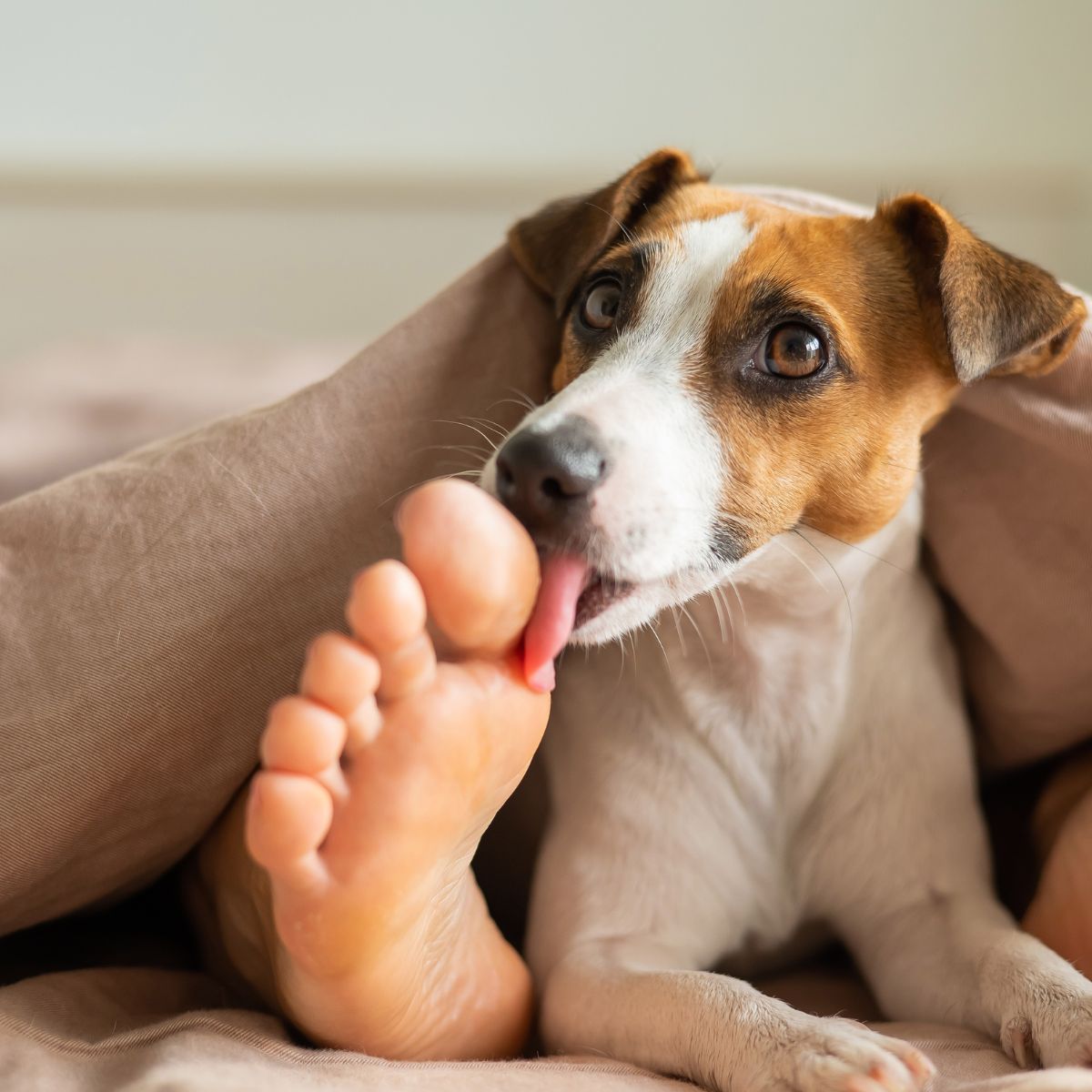If your dog absolutely loves licking your feet, you are not alone! Many dogs enjoy giving their owner’s feet a tongue bath every now and again. This behavior might be unpleasant if you have ticklish feet or an aversion to slobber. Irksome as it may be, rest assured, it’s perfectly normal.
Even some completely normal dog behaviors can feel confusing to humans when we don’t understand them. If you are concerned about the frequency of your dog licking your feet or want tips on how to get them to stop, read on to understand why dogs lick and when it might signal a deeper issue.

Jump to:
Why do dogs lick?
For a dog, licking is the way that they communicate affection and explore the world around them. From the time they are born, their mom licks them to show both love and provide care and grooming. When and who to lick are social skills that dogs are taught early on.
Dogs may lick to show submission or bond within their pack. If you have more than one dog, It’s not uncommon to see the more submissive dog lovingly licking the ears of the pack leader. They may also lick to get the attention of their human counterparts or show you they need comfort.
In short, licking plays a crucial role in a dog’s world and helps form social hierarchies within that world. While some owners might find it irritating, licking is simply a way of life for our canine friends.
Why my feet?
The reasons that dogs are attracted to feet are the same reasons many humans find them gross. Our feet tend to be sweaty, smelly, and salty. Not only can your dog find this combination tasty, but it also provides them with a buffet of your pheromones.
Dogs have an additional sensory organ called the Jacobsen’s organ that connects the nasal cavity to the roof of their mouth. This allows them to smell while they are tasting or licking. A dog’s sense of smell is over 10,000 times as powerful as ours. The many smells on our feet let our dogs know where we have been and who we have been around.
It’s also likely that you produce a reaction when your dog licks your feet. Whether you giggle or jump, your dog now knows that they are getting your attention when they lick your feet. This can create a positive feedback loop. The more they lick, the more of a reaction that they get.
How do I get them to stop?
Letting your dog lick your feet is perfectly natural and harmless, but if you find it personally annoying, there are techniques to get them to stop. Do not chastise or yell at your dog for licking your feet. Always use positive reinforcement training techniques.
You can try distracting and redirecting with a high-value toy. When you sense they are going to lick, or there is a scenario where they typically go for your feet, get their attention onto the toy. You can also practice not giving a reaction if you suspect it’s attention-seeking behavior. If they stop licking without reaction, reward them with a treat.
What if the licking becomes obsessive?
There is absolutely such a thing as too much licking. If your dog’s behavior has crossed over into an obsession, it can be cause for concern. Excessive licking of anything (not just feet) can be a sign of unchecked anxiety. Since licking can be a source of comfort for our pups, too much licking might mean they are feeling on edge.
Dogs can also lick excessively if they are feeling sick. When dogs are feeling pain or discomfort, they might turn to lick to try to self-soothe. If your dog is suddenly licking much more than usual, check with your vet to make sure they have a clean bill of health.
Why does my dog lick their own feet?
A dog licking its own feet can also be a sign of an underlying medical issue. Dogs can sustain cuts, abrasions, and insect bites to their paws without you noticing. A dog’s natural instinct is to tend to its wounds. However, this can actually exacerbate the situation causing inflammation or secondary infection.
If your pup is licking at a paw (or paws), give them a thorough visual inspection. Be sure to look under the paw and between each toe. If you see swelling, redness, or bleeding, consult your veterinarian right away. Paw licking can also be a sign of allergies, parasites, or ringworm. If your dog exhibits prolonged paw licking, it’s best practice to get them checked out.
As always, if you are concerned about your dog’s health or behaviors, it is best to consult your pet professionals. Veterinarians and trainers are always going to be the best resources we have to care for our animal companions.

Comments
No Comments